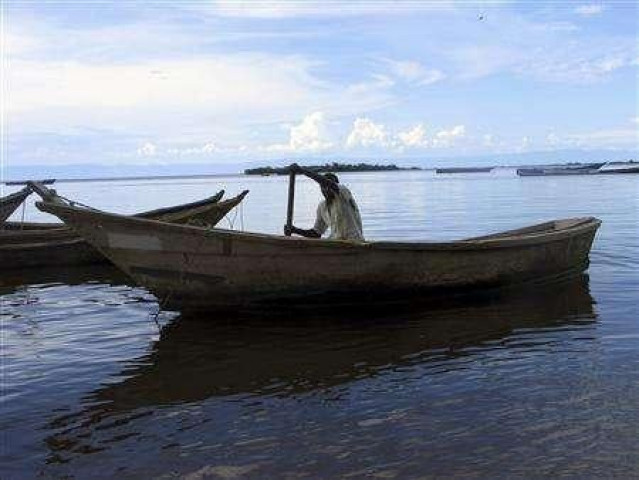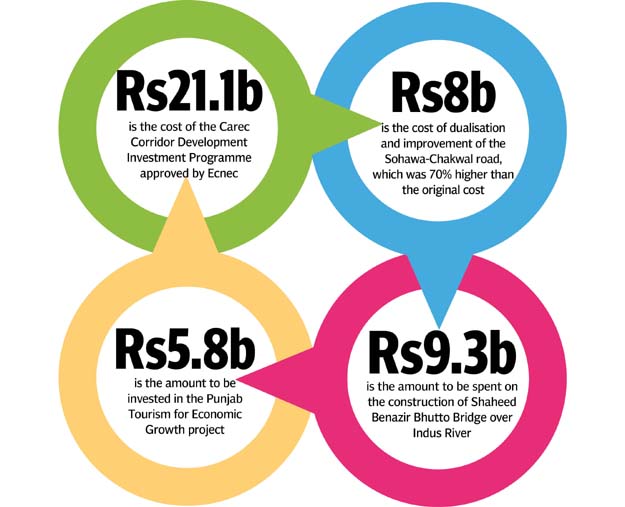ECNEC approves RBOD-II project as Sindh agrees to pay its share
Project costing Rs62b will help stop contamination of Manchar Lake

A fisherman paddles his boat. PHOTO: REUTERS
Headed by Finance Minister Ishaq Dar, the Executive Committee of National Economic Council (Ecnec) gave the go-ahead to the much-delayed project along with six other schemes.
Ecnec - the highest project-approving authority - approved a total package of Rs134.4 billion including three projects designed to stop the contamination of lakes.
Water shortage: Farmers of Sindh appeal to Punjab for help
The committee also gave its seal of approval to a Rs21-billion regional road corridor initiative that would connect East, South and Central Asia.
The additional chief secretary of Sindh told Ecnec that the provincial government was willing to contribute its share of the cost of the project called the Extension of Right Bank Outfall Drain (RBOD-II) from Sehwan to the sea, said an official of the Ministry of Finance.
Owing to disagreement over financing modalities of the RBOD-II, work on RBOD-I and RBOD-III had also been facing delay. These two projects are being funded by the federal government while the RBOD-II is being financed both by the federal and Sindh governments.
RBOD-I or the Lower Indus Right Bank Irrigation and Drainage Project will be completed at a cost of Rs17.5 billion. Similarly, the project of Balochistan’s effluent disposal into RBOD-III, which will cover areas of Nasirabad and Jaffarabad in Balochistan and Jacobabad, Kambir and Shahdad Kot in Sindh, will be completed at a cost of Rs10.8 billion.
 CREATIVE COMMONS
CREATIVE COMMONSThe original revised cost of extending the RBOD-II, which would pass through Dadu and Thatta districts of Sindh, stood at Rs64.7 billion. However, work had been halted due to scarcity of funds as the federal government decided to release the remaining Rs25 billion only when the Sindh government provided its share of Rs14 billion.
Earlier, the provincial government refused to share the cost, claiming it never committed to providing funds in the past. This led to the abandoning of work on the treatment plant due to massive funding issues.
Completion of the project could stop contamination if water is released from Nai-Ganj Dam into the Manchar Lake. The matter of contamination of Manchar Lake has also been pending before the Supreme Court.
Complying with SC orders, Sindh doubles water, sanitation budget
Ecnec also approved the Carec Corridor Development Investment Programme at a cost of Rs21.1 billion. The project is aimed at dualisation and rehabilitation of 208km-long three road sections on N-55 in the provinces of Sindh and Khyber-Pakhtunkhwa.
The Carec corridor - an initiative of the Asian Development Bank - will meet the needs of surrounding countries that will be interconnected through Pakistan, which will act as a regional hub to promote regional integration and intra- and inter-regional trade.
Pakistan’s road network is connected to the Carec Corridor 5, which opens a vital trade link between landlocked Central Asian nations and the country’s warm water ports of Gwadar and Karachi on the Arabian Sea.
This Rs21.1-billion project has been designed to improve 208 km of the N-55 road in three sections. This includes dualisation of the Petaro-to-Sehwan section covering 128 km, Ratodero-to-Shikarpur section covering 44 km, including the construction of a 2km bypass at Lakhi Town to avoid the huge cost of land and the impact of resettlement, and rehabilitation of the existing dual carriageway from Darra Adam Khel to Peshawar over 36 km.
Ecnec approved dualisation and improvement of the Sohawa-Chakwal road at a cost of Rs8 billion, which was 70% higher than the original cost. Former prime minister Raja Pervez Ashraf had got the project approved at Rs4.7 billion, but it became disputed because of many violations of rules.
Ecnec also gave its nod for the Punjab Tourism for Economic Growth project with an investment of Rs5.8 billion. Another project for construction of the Shaheed Benazir Bhutto Bridge over Indus River was approved at a cost of Rs9.3 billion.
Published in The Express Tribune, July 27th, 2017.
Like Business on Facebook, follow @TribuneBiz on Twitter to stay informed and join in the conversation.



















COMMENTS
Comments are moderated and generally will be posted if they are on-topic and not abusive.
For more information, please see our Comments FAQ